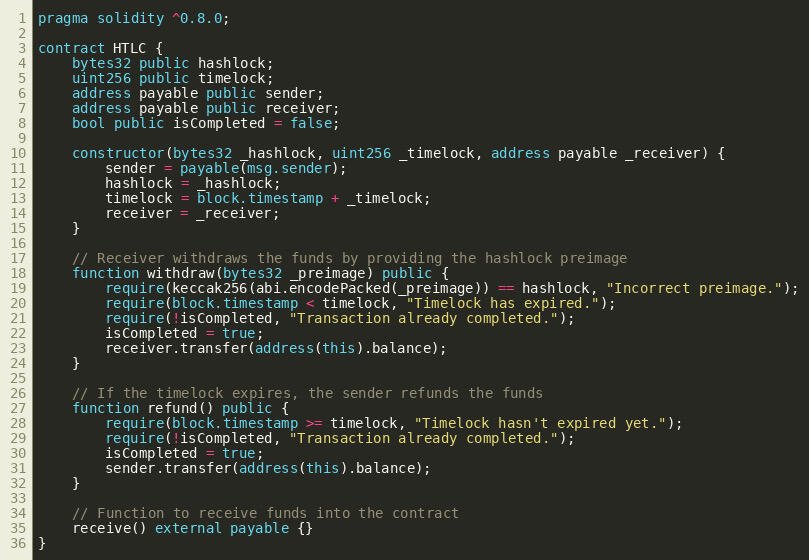On-Chain vs. Off-Chain Swaps:
Atomic swaps can occur both on-chain and off-chain. Off-chain swaps happen outside the main blockchain, which speeds up transactions and reduces the load on the network. However, the primary concern is how to ensure security in off-chain transactions. Off-chain atomic swaps are often executed through second-layer solutions like the Lightning Network.
In off-chain swaps, security is primarily maintained using Hashed Time-Locked Contracts (HTLCs) and cryptographic verifications. HTLCs are crucial in both on-chain and off-chain atomic swaps.
Technical Details:
What Are HTLCs?
HTLCs are smart contracts that impose conditions based on time and cryptographic hash values. They ensure that a transaction will only complete if a specific encrypted value (hash) is revealed within a set time frame. If the value is not revealed, the transaction is canceled, and the funds are returned. These two mechanisms maintain security.
uploaded as image HTLC code example
What’s Happening Here?
1. Contract Creation: Alice initiates the contract to swap with Bob. Alice creates a hash value (hashlock), and Bob needs to unlock it by providing the preimage. There is also a time limit (timelock) defined; if the swap is not completed in time, Alice can retrieve her funds.
2. Withdraw Function: Bob unlocks Alice’s funds by providing the correct preimage. The contract checks whether the preimage matches the hashed value using keccak256 hashing.
3. Refund Function: If Bob fails to provide the preimage within the time limit, Alice can call the refund function to retrieve her funds.
The security of this system relies on the cryptographic hash lock and the time-bound conditions. Both parties must act within the time constraints and with the correct information, or the funds will be refunded, ensuring no loss of assets.
Additional Security in Off-Chain Atomic Swaps:
In off-chain atomic swaps, additional security is ensured through second-layer solutions like the Lightning Network. Transactions happen outside the main blockchain and are finalized without being recorded on-chain. Security is ensured using multi-signature wallets and signed data that validate every step of the process.
Example: When Alice and Bob perform an atomic swap through the Lightning Network, they open payment channels. These channels ensure that funds cannot be moved without both parties’ signatures. In case of a dispute, the payment channels are closed, and the funds revert to the main blockchain, guaranteeing security.
#btc #bitcoin #xmr #monero #eth #ethereum #evm #contract #solidity #code #atomic #swap #edu

